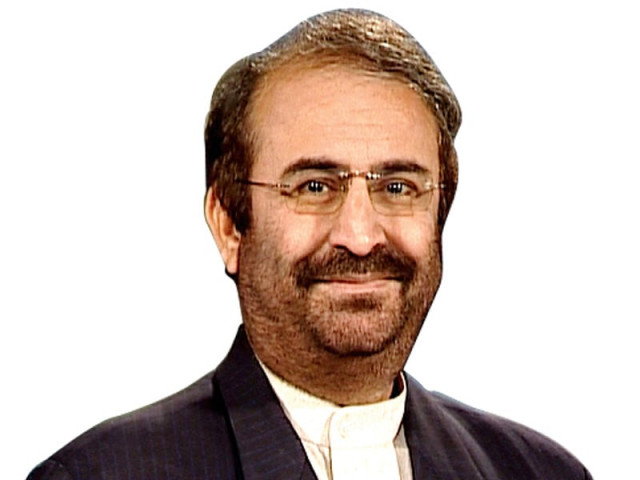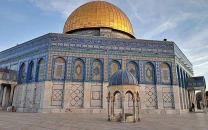Afghans split over impact of Hakimullah’s death on peace
Say Afghan Taliban will doubt US quest for talks in the wake of TTP chief’s killing.

Say Afghan Taliban will doubt US
quest for talks in the wake of TTP chief’s killing.
The news of Tehreek-e-Taliban Pakistan (TTP) chief Hakimullah Mehsud’s death in a US drone strike in North Waziristan on November 1 was the lead story in Afghanistan’s electronic and print media.
Almost all TV channels airing current affairs programmes debated the possible impact of the American attack on the Afghan reconciliation process, as it has derailed Pakistan’s own peace efforts. They fear the country may not fully focus on its key role in Afghanistan, at least for now.
Afghan President Hamid Karzai also felt the likely repercussions and criticised the timing of Hakimullah’s death. Karzai used his meeting with a visiting US Congress delegation to point out the drone strike “took place at an unsuitable time”, but expressed hope the peace process would not suffer. Karzai’s foes, the Afghan Taliban, also condemned the killing of the TTP chief.

Members of the Karzai-backed peace council had similar views. These members have been anxiously awaiting Islamabad’s role in encouraging the Afghan Taliban to sit face-to-face with them and seek a political solution prior to the withdrawal of Nato forces.
Hakimullah’s death has now put a question mark on Pakistan’s role in war-torn Afghanistan, at a time when the new TTP chief, Mullah Fazlullah, will lead his bloody campaign from Afghan soil. Fazlullah is wanted by Pakistan for the killing of security forces and the previous government had announced a Rs5 million bounty on his head.
Pakistan has, on a number of occasions, officially sought the extradition of Fazlullah, who has regrouped his band of militants from Swat in Afghanistan’s mountainous Nuristan province. Fazlullah’s fighters have launched a series of attacks on security forces since they fled to Afghanistan in 2009.
“We have shared dossiers on Fazlullah both with the Afghan government as well as ISAF. We are intensively engaging both sides to take care of this issue and hope that some action will be taken,” the Pakistani Foreign Ministry said in a previous statement.
The TTP has now formally refused to talk to the government and Fazlullah will devise and execute plans for attacks from Afghan soil, which could lead to diplomatic tensions between Pakistan and Afghanistan, whose cooperation is a key to peace in both countries. Islamabad will not opt for any peace role in Afghanistan if Pakistani militants keep up cross-border attacks.
Afghan peace negotiators are confident the death of Mehsud will not have any negative impact on the peace process in Afghanistan. “I do not think the killing of the TTP chief will derail the peace efforts in Afghanistan,” senior member of the Afghan High Peace Council, Habibullah Fawzi, told The Express Tribune via telephone from Kabul. “We seek the Pakistani government’s help to facilitate our direct contact with the Afghan Taliban; this has nothing to do with Mehsud’s death,” said Fawzi, who has served as a senior diplomat at the Afghan embassy in Islamabad during the Taliban rule.
When asked about the proposed visit of the peace council to Pakistan to meet Afghan Taliban leader, Abdul Ghani Baradar, Fawzi said no final decision had been taken yet, but preparations for the trip were underway. Prime Minister Nawaz Sharif had agreed to a proposal by President Karzai for such a meeting at the trilateral summit, hosted by British Prime Minister David Cameron, in London late last month.
Afghan analysts such as former Afghan Foreign Ministry official and writer Waheed Muzdha have a different take on the situation. Speaking to The Express Tribune, Muzdha said the Afghan Taliban would now strongly believe the US does not want peace, as their recent drone attack has scuttled the process in Pakistan. He warned TTP’s vengeful attacks on foreign forces could cause security concerns in Afghanistan.
“As the Pakistani Taliban have announced to take revenge, they could also direct their attacks toward the Americans in Afghanistan,” Mazdha added.
The independent Hasht-e-Subh Daily wrote in its editorial that the death of Hakimullah Mehsud is a major setback to Taliban militants operating on either side of the border. However, the daily warned “the killing of Mehsud would negatively affect the efforts by Islamabad for talks with the Pakistani Taliban, who would now be bent on revenge.”
Published in The Express Tribune, November 9th, 2013.



















COMMENTS
Comments are moderated and generally will be posted if they are on-topic and not abusive.
For more information, please see our Comments FAQ